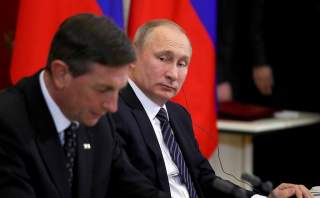On Russia, America Should Pick Its Battles
Here’s a fact: we’re not in the Cold War anymore.
Why the New McCarthyism?
This assessment of the current dynamics between Russia and the United States leaves us with an important question, and a few policy takeaways. The immediate question is: why are we seeing a political and media witch hunt, and the rhetoric of enmity reminiscent of the worst days of the Cold War, if the threats are in no way the same and the goals of the states need not be opposed? Furthermore, why is taking place so soon after former president Obama mocked Mitt Romney’s anti-Russia fearmongering, with the glib 2012 presidential-debate jab that “the 1980s are now calling to ask for their foreign policy back”?
Part of the answer is, of course, Russia’s newfound aggression in Ukraine and Syria. Another answer is anger over Russia’s blatant interference in the 2016 elections. This anger is justified, as is foreign anger over American clandestine interference and spying. This leads to the most important reason for the new McCarthyism, this time on the left. Very few experts expected Trump to actually win the election, and if Putin did, he must have been more politically astute than the best and most accomplished American pollsters, pundits and political strategists.
The truth is that Russia hacked Hillary Clinton’s and the DNC emails because they could. We do the same thing; that is part of what intelligence does. There is, however, no evidence, nor do experts believe it is possible, that Russia actually manipulated the election process. Therefore, the Democrats are still reeling from their electoral loss to Trump, against an opponent who ran on an openly pro-Russian platform. Ratcheting up anti-Russian sentiment and looking for any inkling of Russian ties is a relatively effective way of popularly discrediting Trump’s administration.
How to Proceed
A major potential problem with politicized witch hunts is that they do not only impact domestic politics, but they can have serious international ramifications as well. Rhetoric, political actions and policies conveying enmity can become a self-fulfilling prophesy, with trust eroding as one side responds to what it views as hostility with actions that are likewise viewed as hostile by the other side. Because Russian and American interests need not collide, and because cooperation would be highly beneficial for many shared objectives, not the least of which is the global war on terror and defeating ISIS, the ratcheting up of hostility is counterproductive to American foreign-policy interests. Those in politics and in the media who are recklessly fostering an anti-Russia witch hunt would be wise to step back and understand that while trying to peg the Trump administration as a Russian subversive plant might be an attractive course of action, in terms of useful propaganda for partisan purposes in a highly contentious domestic political environment, it is ultimately short-sighted and negatively impacts American strategic interests.
We need to be staunch in the areas that are vital to us, and humbly bow out and save face in areas where Russia maintains a superiority of resolve. Otherwise, they will keep bucking us and we will keep being embarrassed. The Russians are Machiavellian, but we should expect that from every country and Russia expects it from us. Lord Palmerston famously said, “Britain has no permanent friends or enemies, only permanent interests.” The American relationship with the Russians has fluctuated over time, from close allies in World War II to bitter rivals in the Cold War. This relationship will continue to change over time, but by understanding where our interests converge and where they diverge, successful cooperation can be achieved and unnecessary and embarrassing foreign-policy defeats can be avoided.
Jeremiah Rozman is in his third year of a PhD program in International Relations at the University of Virginia. His dissertation work as well as other research focuses on state formation of military strategy towards countering non-state opponents. He is also a veteran of the Israel Defense Forces, in which he was a Point Light Machine Gunner in the Golani Brigade 51st Regiment for 2.5 years.
Image: Vladimir Putin with Slovenia’s President Borut Pahor. Wikimedia Commons/Kremlin.ru

